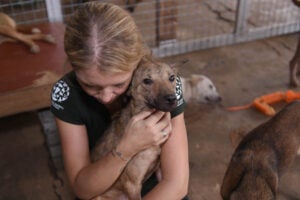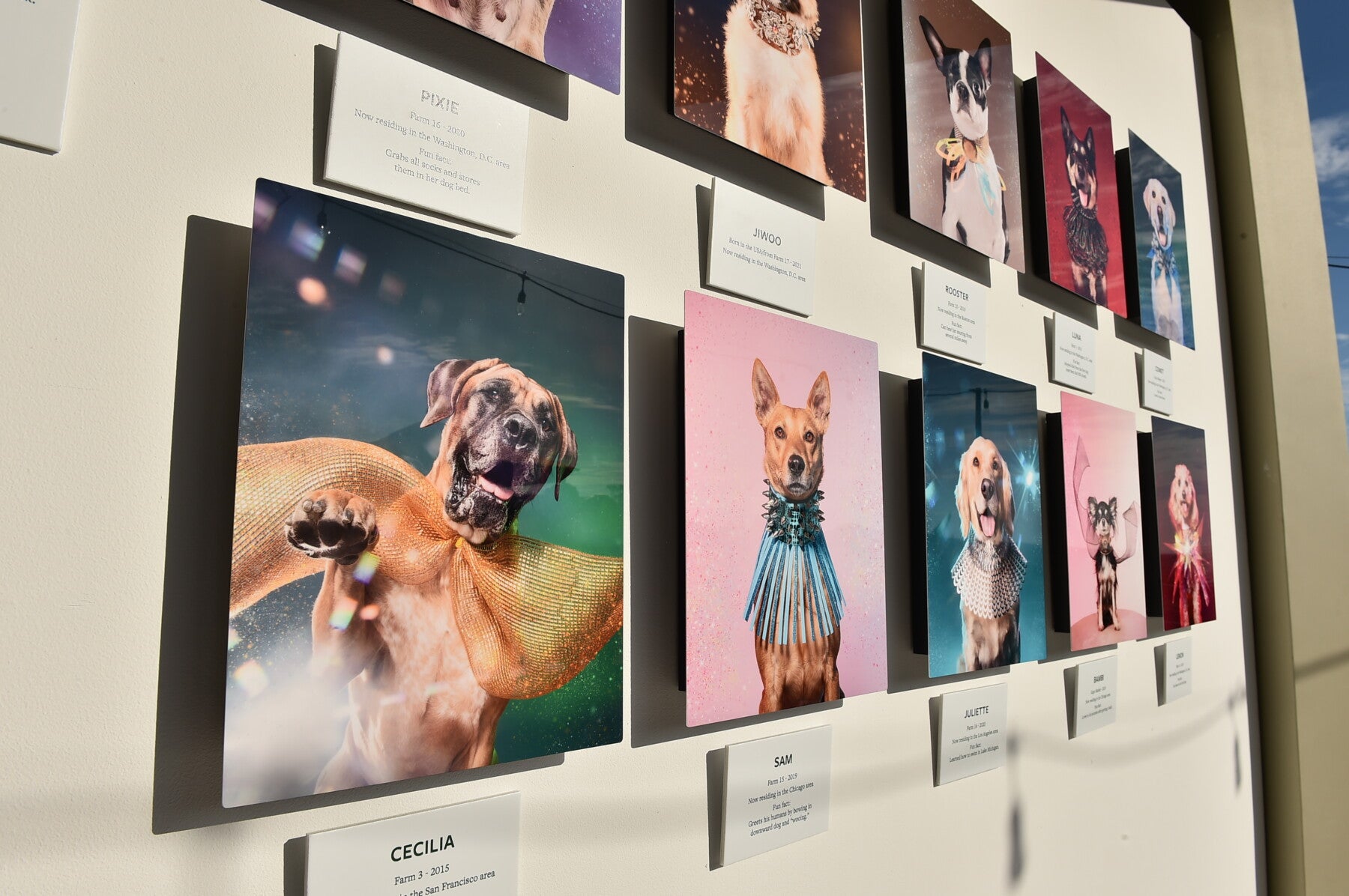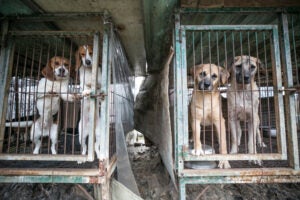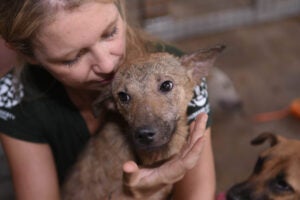
CENTRAL JAVA, Indonesia—A dog slaughterhouse owner in Sukoharjo, Indonesia who bought and killed thousands of dogs every year for human consumption has been sentenced to 12 months in jail and a fine of 150 million Rupiah ($10,000 USD). More than 50 terrified dogs were rescued during a police interception at his property last year, and were cared for by campaigners from the Dog Meat Free Indonesia (DMFI) coalition. The dogs had been trafficked from West Java on a grueling 365-mile journey, tied up in sacks and many had their muzzles bound shut. DMFI member groups Humane Society International and Jakarta Animal Aid Network are preparing to fly the dogs to Canada to seek adoption and help them put the trauma of Indonesia’s dog meat trade behind them.
Suseno, the slaughterhouse owner, was found guilty of breaking Law 18 of 2009 chapter 89 regarding animal health and husbandry. The trade within which he operated sees pet and roaming dogs stolen from the streets in West Java to meet demand in dog meat eating hotspots in Central Java. One such hotspot is the city of Solo, the birthplace of Indonesia’s president Joko Widodo, where an estimated 13,700 dogs are killed for meat every month. Across Indonesia, an estimated one million dogs are killed annually. The DMFI coalition is calling for a national ban on the brutal trade.
This marks the country’s third conviction of a dog meat trafficker since the national government’s declaration in 2018 that “dogs are not food.” The Dog Meat Free Indonesia coalition applauds the Sukoharjo police for pursuing the case but says only a nationwide ban and zero-tolerance enforcement will stamp out the cruelty of this dangerous trade.
Karin Franken of Jakarta Animal Aid Network and national DMFI coordinator, said: “The Sukoharjo police are to be congratulated for not giving up, and using the laws available to them to secure this conviction. But our police forces could be greatly helped in cracking down on this cruelty if only the government introduced an explicit national ban on the dog meat trade. The brutal trafficking and butchering of companion animals is rife in many parts of Indonesia, including president Jokowi’s home city, making a mockery of the government’s public statements that dogs are not food. Criminals like Suseno need to be brought to justice to protect animal welfare and public health from this crime-fueled, disease-spreading and cruel trade.”
Bali-based Lola Webber, Humane Society International’s director of campaigns to End Dog Meat, was at the police interception to help rescue the 50+ dogs. Webber recalls: “Seeing the terrified and traumatized faces of those dogs huddled together in the back of the truck is something that will stay with me for the rest of my life. They were skin and bone, dehydrated, weak and bewildered. But at the Dog Meat Free Indonesia shelter we’ve been able to heal their fragile bodies and give them the love and care they deserve. Soon, we will fly them to Canada where they will be available for families to adopt them into loving homes. It’s very satisfying knowing that the man who caused them so much suffering is going to prison, but many more dogs will continue to suffer until a definitive law is in place.”
Nationwide opinion polls show that only a small minority of Indonesians (4.5%) ever consume dog meat, and 93% of all Indonesians support a ban. Despite this, over one million dogs are still stolen, trafficked, slaughtered and sold for human consumption every year across Indonesia, jeopardizing anti-rabies efforts and representing a substantial public health threat. Rabies is endemic across most of Indonesia, with only eight provinces holding rabies-free status. With dogs being routinely stolen from rabies positive areas and trafficked into rabies-free areas, the dog meat trade actively undermines attempts to control the deadly disease.
Dog meat trade facts:
- Dog theft for the meat trade is a serious problem in Indonesia. Dog Meat Free Indonesia has interviewed many residents who have described their terrifying ordeal with armed traders stealing their pets at night. Despite the obvious law-breaking, thefts are rarely taken seriously by law enforcement, so the thieves often go unpunished.
- The dog meat trade in banned in 17 cities and regencies across Indonesia: Karanganyar, Sukoharjo, Salatiga city, Malang, Semarang city, Semarang Regency, Blora Regency, Brebes Regency, Purbalingga Regency, Magelang city, Jepara, Blitar city, Mojokerto City, Mojokerto Regency, Temanggung, Magelang Regency and Medan city.
- Across Asia, opposition to the dog and cat meat trades is increasing, with an ever-growing number of countries and territories (Taiwan, Hong Kong, the Philippines, Thailand and two major cities in mainland China) banning the trade in and slaughter, sale and consumption of dogs. In September 2021, South Korea’s then President Moon Jae-in suggested it could be time to consider a dog meat ban, and a government-initiated task force is currently considering the issue. President Yoon Suk-yeol has stated he would not oppose a dog meat ban provided there is social consensus.
- The Dog Meat Free Indonesia campaign comprises local campaigners Jakarta Animal Aid Network and Animals Friends Jogja, and international groups Humane Society International, Four Paws and Animals Asia.
- The rescue of dogs at the Sukoharjo interception was conducted under COVID-19 health and safety restrictions, and a veterinarian was on site throughout. At the DMFI shelter the dogs received rabies, DHPP, coronavirus, distemper and parvo vaccinations. The dogs also underwent quarantine for at least 30 days, and will be health certified again prior to transport overseas.
ENDS
Media Contacts:
- Lola Webber, Humane Society International’s End Dog Meat campaign director, and Dog Meat Free Indonesia international coordinator; Tel: +6281337408768 E-mail: Lwebber@hsi.org
- Karin Franken, Jakarta Animal Aid Network Founder, and national coordinator Dog Meat Free Indonesia Coalition Tel: +6282122487794 E-mail: jaan_adopt@yahoo.com






